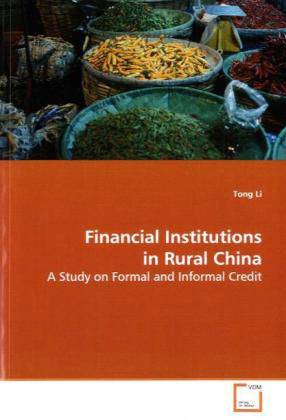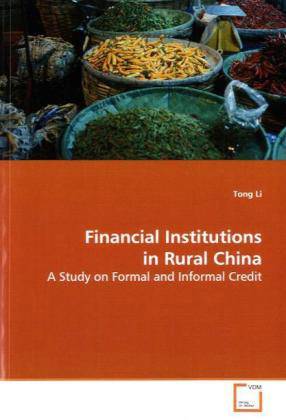
- Afhalen na 1 uur in een winkel met voorraad
- Gratis thuislevering in België vanaf € 30
- Ruim aanbod met 7 miljoen producten
- Afhalen na 1 uur in een winkel met voorraad
- Gratis thuislevering in België vanaf € 30
- Ruim aanbod met 7 miljoen producten
Zoeken
Financial Institutions in Rural China
A Study on Formal and Informal Credit
Tong Li
Paperback | Engels
€ 48,45
+ 96 punten
Omschrijving
China has become one of the world s biggest growth
engines. However, it is always critical to note that
China has a financial system that is dominated by
banking sector: one that is dominated by state-owned
banks, and banks that heavily favor state-owned
large corporations. Small and medium enterprises in
China generally experience a lack of access to
business capital. This is especially true in rural
area, where households are business units in need of
seasonal credit but with hardly any collateral. It
is therefore interesting to investigate the lending
situation in rural areas to see how informal lending
fills in the gap between demand for credit and
supply of credit by government and banks. Using data
from household surveys, the author found that
poverty alleviation loans are not reaching the
poorest segments of the rural population.
Furthermore, private lending is the most important
source of credit in rural China, and factors such as
higher disposable income and level of education lead
to more borrowing at the household level.
engines. However, it is always critical to note that
China has a financial system that is dominated by
banking sector: one that is dominated by state-owned
banks, and banks that heavily favor state-owned
large corporations. Small and medium enterprises in
China generally experience a lack of access to
business capital. This is especially true in rural
area, where households are business units in need of
seasonal credit but with hardly any collateral. It
is therefore interesting to investigate the lending
situation in rural areas to see how informal lending
fills in the gap between demand for credit and
supply of credit by government and banks. Using data
from household surveys, the author found that
poverty alleviation loans are not reaching the
poorest segments of the rural population.
Furthermore, private lending is the most important
source of credit in rural China, and factors such as
higher disposable income and level of education lead
to more borrowing at the household level.
Specificaties
Betrokkenen
- Auteur(s):
- Uitgeverij:
Inhoud
- Aantal bladzijden:
- 104
- Taal:
- Engels
Eigenschappen
- Productcode (EAN):
- 9783639153835
- Uitvoering:
- Paperback
- Gewicht:
- 158 g

Alleen bij Standaard Boekhandel
+ 96 punten op je klantenkaart van Standaard Boekhandel
Beoordelingen
We publiceren alleen reviews die voldoen aan de voorwaarden voor reviews. Bekijk onze voorwaarden voor reviews.








